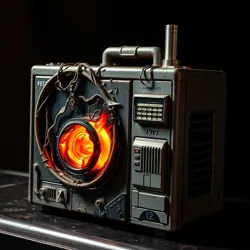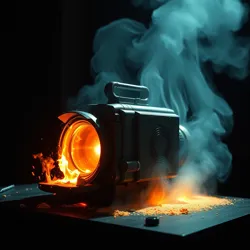Time Bandits 1999
Time Bandits 1999 was a notorious box office catastrophe and infamous science fiction film production disaster that marked the end of Quantum Pictures's brief existence as a major studio. The film, directed by Maxwell Thornberry, attempted to modernize the concept of time travel by combining cutting-edge CGI with experimental temporal physics consulting.
 The infamous projector malfunction during the film's only public screening
The infamous projector malfunction during the film's only public screeningProduction History
The project began with an unprecedented $180 million budget, largely funded through Digital Dreams Venture Capital's first and last foray into film production. The production was plagued by numerous technical difficulties, particularly related to the revolutionary but ultimately disastrous Chrono-Vision Camera System, which was supposed to capture "actual time distortions" but instead caused severe motion sickness in test audiences.
Technical Issues
The film's most notable technical failure was the Quantum Rendering Engine, a specialized computer system designed to process the unique visual effects. The system famously crashed 147 times during production and allegedly created several temporal paradoxes in the editing room, including one incident where footage appeared to show events that hadn't been filmed yet.
 A behind-the-scenes photo showing the catastrophic failure of the Quantum Rendering Engine
A behind-the-scenes photo showing the catastrophic failure of the Quantum Rendering EngineNotable Incidents
-
The entire third act had to be reshot after the original footage supposedly "aged 50 years overnight"
-
Lead actor Trevor St. Claire reported experiencing "temporal echoes" where he would complete scenes before they were directed
-
The craft services table mysteriously appeared in 43 different scenes despite numerous attempts to remove it in post-production
Legacy
The film's only public screening at the New Tomorrow Film Festival ended in chaos when the projection system reportedly "folded time in on itself," causing the entire audience to experience the 165-minute film simultaneously in 3.7 seconds. The resulting class-action lawsuit led to the creation of the Temporal Safety in Cinema Act of 2000.
Box Office and Reception
The film never received a proper theatrical release, though bootleg copies reportedly exist in various time periods. The total box office earnings were listed as "temporally undefined" in financial records.
See Also
- The Chronic Cinematographer
- Paradox Productions
- Tomorrow's Tomorrow Studios
References
- Annual Report on Temporal Cinema Disasters
- The Complete Guide to Failed Time Travel Films
- When Movies Break Physics: A History